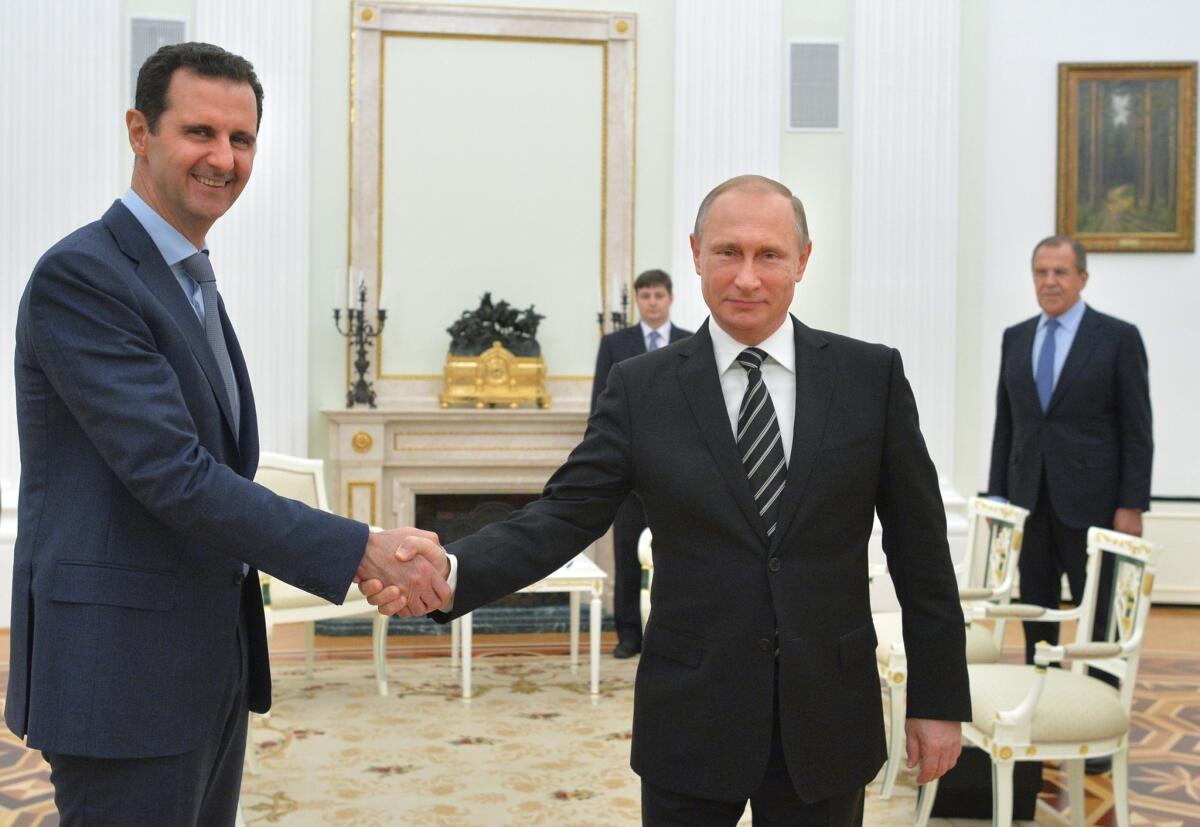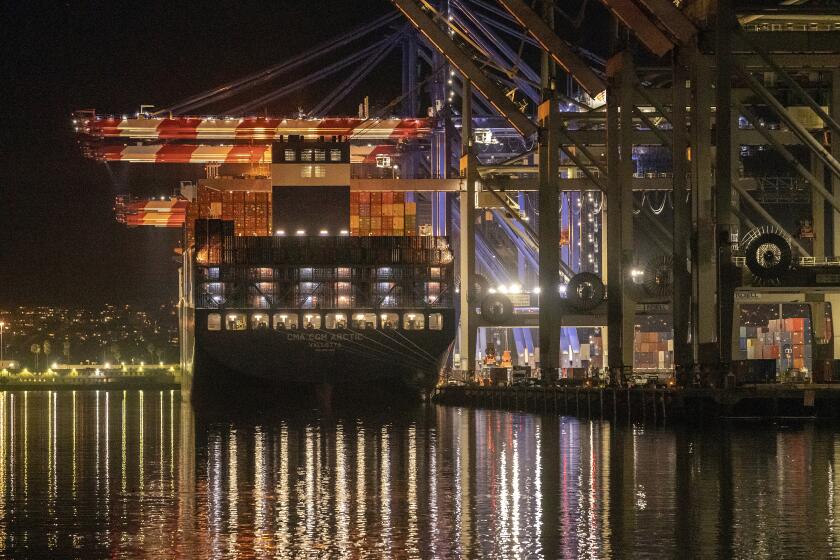Op-Ed: How a monstrous Putin beat the U.S. in Syria

Russian President Vladimir Putin, center, shakes hands with Syrian President Bashar Assad as Russian Foreign Minister Sergey Lavrov, right, looks on in the Kremlin in Moscow, Russia in October of 2015.
The entire world was surprised when, at the end of September 2015, Vladimir Putin suddenly started moving Russian aircraft, tanks and troops into Syria.
At the time, President Obama predicted the Russian intervention would fail.
“An attempt by Russia and Iran to prop up [Syrian President Bashar] Assad and try to pacify the population is just going to get them stuck in a quagmire and it won’t work,” Obama said.
Have something to say? Weigh in on Facebook >>
This week, the world is equally dumbfounded by the Russian president’s announcement that he is withdrawing the “main part” of his forces in Syria. No one knows how big a part of the Russian military presence — consisting of some 4,000 troops and 50 combat aircraft — will return to the motherland or what exactly prompted this latest move.
Putin loves to spring surprises on the world, and that’s not hard to do when you are an absolute autocrat who doesn’t have to rally popular approval for your actions. Just as in the 1930s, it seems that today dictatorships act while democracies dither.
In his latest interview in the Atlantic with Jeffrey Goldberg, Obama tries to wave away what Putin has done in Syria and Ukraine: “The fact that he invades Crimea or is trying to prop up Assad doesn’t suddenly make him a player. You don’t see him in any of these meetings out here helping to shape the agenda. For that matter, there’s not a G20 meeting where the Russians set the agenda around any of the issues that are important.”
It’s telling that Obama thinks that the only thing that matters is the agenda at international gab-fests. That’s because the president, like most European heads of state, lives in a 21st century, post-power world where international law is more meaningful than brute force. Putin, by contrast, inhabits a 19th century, Realpolitik world where strongmen act to advance their own interests with scant regard for the feelings of other states, much less of multilateral institutions such as the G20 or the United Nations. In the clash between these two incompatible visions of the world, there is no doubt which one is winning: From Crimea to Syria, Putin is rewriting the rules of the international game in his favor.
Putin ... inhabits a 19th century, Realpolitik world where strongmen act to advance their own interests with scant regard for the feelings of other states.
In the case of Syria, Putin’s objectives are two-fold. First, he wants to ensure that Assad, a longtime Russian ally (and buyer of Russian weapons), is not toppled. Last fall, rebel forces were advancing and threatening Assad’s grip on power. No longer. The Russian intervention was ostensibly supposed to attack Islamic State. In fact, some 90% of Russian sorties have been directed not at its strongholds but at more moderate rebel groups backed by the United States. This has enabled Assad to regain part of Aleppo province and to consolidate his hold on an eastern corridor running from Damascus to the Mediterranean Sea.
Putin’s second objective is to reassert Russian power in the world — to make clear that Russia is not isolated after the unlawful invasion of Ukraine and that, in fact, it is ready to challenge American primacy in the Middle East, a region where the U.S. has been the dominant power for decades. That mission also has been accomplished. As a bonus, Putin even got to show off the capabilities of a new generation of advanced weapons systems, from fighter jets to cruise missiles, that he hopes to sell to eager customers around the world.
Putin probably figures that it’s time to ratchet down his commitment before the cost of intervention grows. Tellingly, his decision came shortly after a Syrian MiG-21 was shot down by a portable surface-to-air missile — reportedly a U.S.-made Stinger. This would have been a grim reminder to Putin of the Russian war in Afghanistan. He has no desire to risk such a costly conflict again — and no need to do so.
Putin can achieve his limited objectives in Syria at much lower cost, and if Assad gets into trouble again, it’s easy enough for Putin to send back more Russian forces. He is not, after all, giving up the newly established Russian airbase in Latakia province. It will now be Russia’s second military installation abroad, alongside the long-standing Russian port facility nearby at Tartus on the Syrian coast.
Seen through a lens of morality, what Putin has done is monstrous — he is helping to prop up a bloodthirsty regime that has been responsible for killing hundreds of thousands of people and turning millions more into refugees. But from the narrow vantage point of Russian self-interest, Putin has pulled off another coup and shown that he is a more adept international poker player than his counterpart in Washington.
Max Boot is a contributing editor to Opinion and a senior fellow in national security studies at the Council on Foreign Relations.
Follow the Opinion section on Twitter @latimesopinion and Facebook
MORE FROM OPINION
Trump isn’t the only one at fault for the violence at his rallies
It’s time for Republican voters to reject Trump and his reckless rhetoric
How politics built L.A.’s Gold Line at the expense of a smarter system
More to Read
A cure for the common opinion
Get thought-provoking perspectives with our weekly newsletter.
You may occasionally receive promotional content from the Los Angeles Times.






